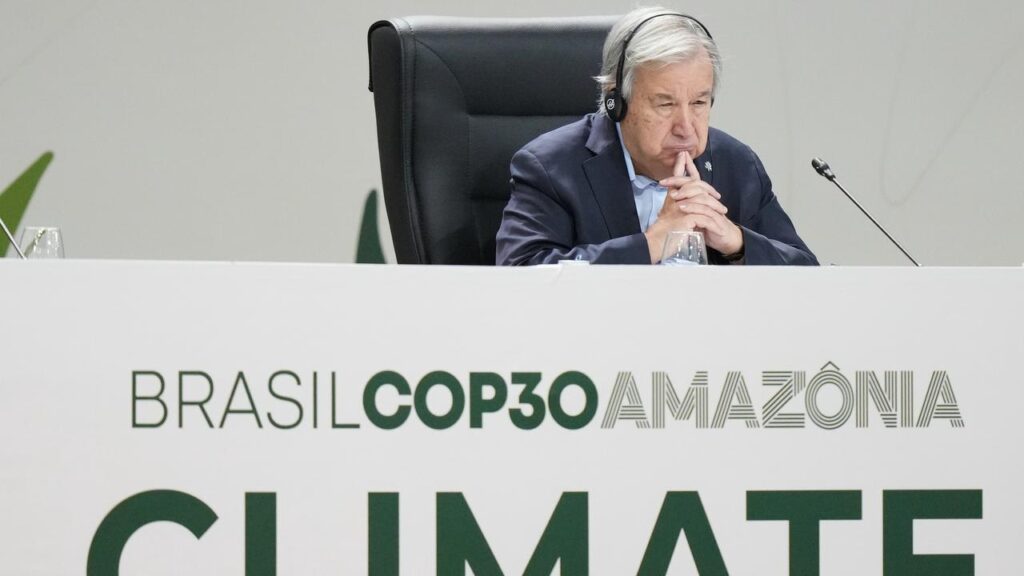Loss of consensus lamented at UN climate summit
Isabel Debre and Mauricio Savarese |

World leaders are warning that time is running short for urgent and decisive action on climate change, with several blasting the US for its retreat from those efforts.
UN Secretary-General António Guterres opened the annual climate summit, being held in Belem, Brazil with harsh words for world powers who he said “remain captive to the fossil fuel interests, rather than protecting the public interest.”
Allowing global warming to exceed the key benchmark of 1.5 degrees Celsius, laid out in the Paris Agreement, would represent a “moral failure and deadly negligence,” Guterres said, warning that “even a temporary overshoot will have dramatic consequences … every fraction of a degree higher means more hunger, displacement and loss.”

Brazil President Luiz Inácio Lula da Silva hopes to convince world powers to mobilise enough funds to halt the ongoing destruction of climate-stabilising tropical rainforests around the world and advance the many unmet promises made at previous meetings.
In a rousing speech touting the Tropical Forests Forever Facility, Lula said there was no greater symbol of the environmental cause than the Amazon.
Some 17 per cent of the Amazon’s forest cover has vanished in the past 50 years, swallowed up for farmland, logging and mining.
“It is only right that it is the turn of the Amazonian people to ask what the rest of the world is doing to prevent the collapse of their home,” Lula said.

But the planet’s three biggest polluters, China, the United States and India are notably absent from the two-day gathering of heads of state, ahead of formal climate talks that begin next week at the Conference of Parties, known as COP30.
US President DonaldTrump, who withdrew the US from the Paris climate accords the day he entered office, won’t send any senior officials. China sent its deputy prime minister.
Advocates and diplomats have raised concerns that the absence of the US could signal a broader global retreat from climate politics.
President Gustavo Petro of Colombia called out Trump directly, saying his absence was “100 per cent wrong.”
Chile’s left-wing President Gabriel Boric similarly singled out Trump, saying his recent speech denying climate change at the UN General Assembly was “a lie.”
Indigenous groups warned that Trump’s inaction could embolden other countries to ignore the crisis.

President Javier Milei of Argentina, also boycotted this week’s meeting.
That left leaders like UK Prime Minister Keir Starmer, and French President Emmanuel Macron to confront the consequences of an intensifying global climate crisis a decade after the Paris Agreement promised a new era of global cooperation.
“Today, sadly, that consensus is gone, with some arguing that this isn’t the time to act and saying that tackling climate change can wait,” Starmer said in his address.
Even among those committed to the cause, there were some competing priorities.
European nations are throwing their weight behind a plan to save the Congo rainforest, a plan that may steal some thunder from Brazil’s flagship initiative.
The French-led plan — backed by Germany, Norway, Belgium and Britain — is called “The Belem Call for the Forests of the Congo Basin.”

“The donors are … committing to mobilise more than $2.5 billion over the next five years, in addition to the domestic resources that will be mobilised by Central African countries for the protection and sustainable management of the forests of the Congo Basin,” according to documents seen by Reuters.
While protecting the Congo has drawn attention because it now absorbs more net greenhouse gases than other forests, the timing of the news threatened to distract from Brazil’s focus on a global fund.
“In theory, both initiatives are very different,” said a diplomat familiar with both proposals, noting that the Brazilian plan would offer annual payments to rainforest nations with no strings attached. Still, the optics of two rival rainforest funds may be unhelpful, the source added.
Norway pledged $3 billion to the Brazilian plan on Thursday, the biggest contribution so far. France said it could contribute up to 500 million euros to the Brazilian-led initiative.
with Reuters
AP